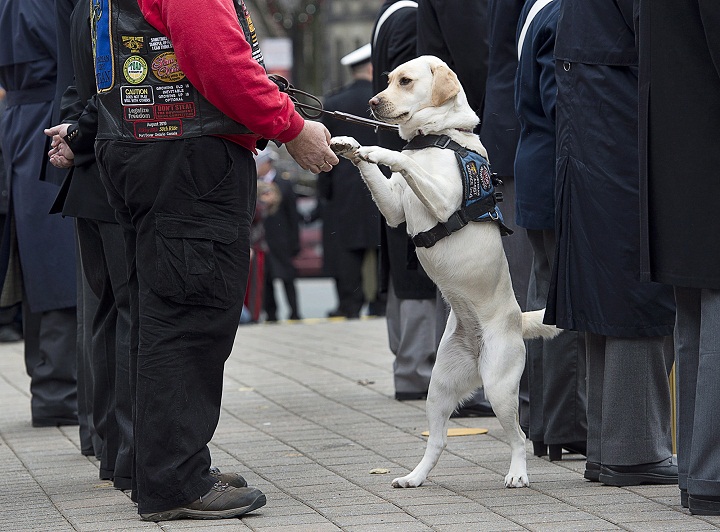PRINCE ALBERT, Sask. – A military veteran who needs a service dog says he was turned away from a restaurant in Saskatchewan.

Michael Sharron, who has post-traumatic stress disorder, says he needs the dog, Rylie, with him for medical reasons.
Sharron says he and his father-in-law went to a Smitty’s restaurant in a Prince Albert mall for lunch on March 3.
He says they were greeted by a man, who turned out to be the owner, who told them that dogs weren’t allowed.
Sharron says he explained that he needed Rylie with him for medical reasons, but when asked what they were, Sharron wouldn’t go into details.
Owner Ray Littlechilds says Sharron gave no indication he was an Armed Forces veteran.
“I told him that he was a service dog, and he was certified, and he said, `Is he a seeing-eye dog?’ I said, `No, he’s for a medical service for a condition that I have,”‘ Sharron said.
Sharron also explained he had paperwork for Rylie.
Service dogs can help people with PTSD manage their symptoms. Sharron keeps Rylie’s leash tied to his waist and the dog provides him with a distraction.
The conversation between Sharron and the man was loud enough to draw attention from other people in the restaurant, said Sharron, who is from Shellbrook, Sask.
- What is a halal mortgage? How interest-free home financing works in Canada
- Capital gains changes are ‘really fair,’ Freeland says, as doctors cry foul
- Ontario doctors offer solutions to help address shortage of family physicians
- Budget 2024 failed to spark ‘political reboot’ for Liberals, polling suggests
“I’m looking around and feeling like if I can crawl into a hole, I would,” he said.
Littlechilds emphasized his support for Canadian military veterans. His uncle died in combat and other family members have served.
“We couldn’t allow him in on the way he talked to us,” Littlechilds said. “He says, `This is none of your business’ … and I said, `Well, I can’t let you in.”
Sharron said he decided not to press the issue. He started to leave, but briefly sat on a bench near the exit to make a phone call to Rylie’s trainer.
He said Littlechilds told him he would have to go out into the foyer of the mall to do that.
Sharron called a lawyer for Manitoba Search and Rescue, which trained and provided his service dog. The lawyer has been in contact with Littlechilds.
The owner said another person came to the restaurant days later to scold him and to tell him that Sharron is a veteran. Littlechilds told the man he had no idea that was the case at the time.
“We would have been happy to have him as a guest, as far as an individual,” he said. “I don’t stop people from coming to my business. I welcome every single customer there is. It doesn’t matter what you are, what colour, what race, if there’s any disabilities whatsoever, they are welcome at Smitty’s.”
He said he would welcome Sharron back.
“All we were trying to do was live by the letter of the law of the health regulations and purposes. That’s something that’s very strict.”
Earlier this year, a military veteran based in Cold Lake, Alta., was not allowed to board an Air Canada flight with her service dog. She was told she could travel with the pet for a fee. She, too, has PTSD and owns the dog because it helps her stay calm.
The airline later apologized.

Comments